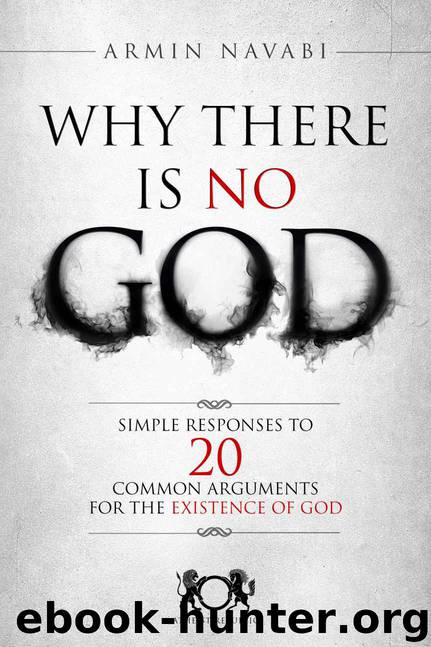Why There Is No God by Armin Navabi & Nicki Hise

Author:Armin Navabi & Nicki Hise [Navabi, Armin & Hise, Nicki]
Language: eng
Format: epub, mobi, azw3
Amazon: B00PSDZN1A
Publisher: CreateSpace Independent Publishing Platform
Published: 2014-05-15T00:00:00+00:00
Chapter 11: “If there is no God, where did everything come from? Without God, there is no explanation.”
The origin of the universe is one of the greatest unanswered questions in the history of mankind. Humans have been debating it for thousands of years, and every religion attempts to posit a different explanation. In Chapter 1, we discussed the issue of complexity and touched on the origins of life. Questions about the origin of the universe – or, indeed, the origin of reality in general – are more challenging for science to tackle head-on. The simple answer is: we don’t know. We may never know exactly how the universe was formed or what, if anything, came before it, although science does have a few ideas to explore. However, not knowing the answer does not give us free range to make something up.
It’s human nature to be uncomfortable with the unknown. Historically, humans have filled these uncertain areas with a deity or other supernatural claims to explain what they have yet to discover. This creates a “god of the gaps,” wherein God is invoked as an explanation in events that humans don’t yet understand. The problem with this, of course, is that scientific knowledge is always expanding, and the gaps continue to grow smaller. We have identified many of the natural causes behind these gaps throughout our history and have yet to come across God in any of them. It’s possible that this pattern will continue in the future, leaving little room for God as a weak explanation, and the current monotheistic ideas of God will become as outdated for future generations as the Greek pantheon is today.
The Prime Mover
The cosmological argument for God is an attempt to infer God’s existence from the known facts of the universe. Essentially, this argument states that because everything is derived by cause and effect, something must have caused the universe to be created. However, although many physical laws of the universe do generally work in a cause-and-effect way, that does not necessarily mean that God is the cause.
If you follow events backwards through time, you will always find a preceding event that led to it, but theists reason that this chain of events could not go on forever. Something must have started all of it into motion. Since events cannot cause themselves, something else must have existed first to cause all of these things.
This might seem like a reasonable argument, but it falls victim to the same problem as the hypothetical God behind the argument from design, as discussed in Chapter 1: if everything has a cause or a creator, then who created God? And who, then, created the entity that created God? Rather than solving the problem of infinite causality, the cosmological argument simply recreates the problem using different terms. God is used as an answer, but in reality, the issue of God simply raises new questions. You cannot solve a mystery by using a bigger mystery as the answer.
This issue falls prey to
Download
Why There Is No God by Armin Navabi & Nicki Hise.mobi
Why There Is No God by Armin Navabi & Nicki Hise.epub
Why There Is No God by Armin Navabi & Nicki Hise.azw3
This site does not store any files on its server. We only index and link to content provided by other sites. Please contact the content providers to delete copyright contents if any and email us, we'll remove relevant links or contents immediately.
The remains of the day by Kazuo Ishiguro(9000)
Tools of Titans by Timothy Ferriss(8396)
Giovanni's Room by James Baldwin(7347)
The Black Swan by Nassim Nicholas Taleb(7130)
Inner Engineering: A Yogi's Guide to Joy by Sadhguru(6796)
The Way of Zen by Alan W. Watts(6614)
The Power of Now: A Guide to Spiritual Enlightenment by Eckhart Tolle(5784)
Asking the Right Questions: A Guide to Critical Thinking by M. Neil Browne & Stuart M. Keeley(5775)
The Six Wives Of Henry VIII (WOMEN IN HISTORY) by Fraser Antonia(5515)
Astrophysics for People in a Hurry by Neil DeGrasse Tyson(5190)
Housekeeping by Marilynne Robinson(4449)
12 Rules for Life by Jordan B. Peterson(4305)
Ikigai by Héctor García & Francesc Miralles(4275)
Double Down (Diary of a Wimpy Kid Book 11) by Jeff Kinney(4273)
The Ethical Slut by Janet W. Hardy(4256)
Skin in the Game by Nassim Nicholas Taleb(4250)
The Art of Happiness by The Dalai Lama(4130)
Skin in the Game: Hidden Asymmetries in Daily Life by Nassim Nicholas Taleb(4007)
Walking by Henry David Thoreau(3963)
